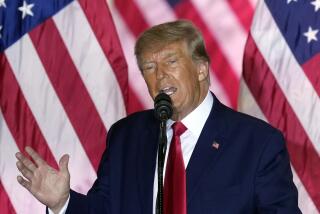Wallach: Helped Wedtech to Aid Bronx
- Share via
NEW YORK — San Francisco lawyer E. Robert Wallach told jurors at his fraud and racketeering trial Monday that he began helping scandal-plagued Wedtech Corp. in 1981 without any promise of pay because he believed that the company might “benefit the entire community” of the South Bronx.
Defending himself against charges that he illegally received $525,000 from Wedtech over a four-year period to use his influence with former Atty. Gen. Edwin Meese III, Wallach also testified that his lobbying of Meese to help the fledgling Latino-run firm get U.S. defense contracts accounted for only a fraction of his contacts with his friend and former law school classmate.
“I spoke with Mr. Meese not more than four or five times (about Wedtech) that first year, 1981, and only two or three times in 1982,” Wallach said.
“I asked him if there was anything that could be done, appropriately, to help them out.”
Wallach’s emphasis on the word “appropriately” paralleled Meese’s insistence last week that he never had shown Wallach any “favoritism” despite their frequent contacts about Wedtech and other matters.
Wallach told jurors that he recalled Ronald Reagan’s campaign promise in 1980 to help the economically deprived South Bronx, if he were elected President. Wallach said that the small defense contractor “seemed to be exactly what should be happening to the Bronx and was exactly what the Administration should have been interested in.”
His testimony came after Meese finished a third day on the witness stand and as Wallach’s nearly three-month-old trial appeared to be nearing a conclusion.
Meese, who last week acknowledged talking to other Reagan Administration officials on Wallach’s behalf, sought in his closing testimony to minimize the time that he and Wallach had spent on Wedtech matters. He said that it occupied about 5% of their conversations.
Before Meese left the witness stand, Wallach’s lawyers tried in vain--outside the presence of the jury--to win permission from U.S. District Judge Richard Owen to subpoena Atty. Gen. Dick Thornburgh as another defense witness.
Gary P. Naftalis argued for Wallach that Baruch Weiss, the prosecutor, had unfairly told jurors in cross-examining Meese last week that Thornburgh, who succeeded Meese, had “adopted” a Justice Department ethics report earlier this year that was highly critical of Meese’s conduct, including his close relationship with Wallach.
Naftalis declared that Thornburgh simply had issued the internal department report without vouching for its findings. Thornburgh also had allowed Meese’s lawyers to make public their rebuttal at the same time, Naftalis noted.
However, Judge Owen agreed with Weiss that it would be “irrelevant” to force Thornburgh to come to New York to answer questions about the report, which prosecutors said only demonstrated Meese’s “state of mind” toward Wallach.
But Naftalis won a stipulation from Weiss, which was read to the jury, noting that the report had been prepared by an independent Justice Department unit and was never officially embraced by Thornburgh.
Wallach, under direct questioning by Naftalis, sought to stress that his initial contact with Wedtech had more to do with his interest in minority and liberal causes than with money.
“Did they promise you any compensation at that time?” Naftalis asked.
“No,” Wallach replied.
Noting that now-defunct Wedtech began as a small machine shop that was owned by Latinos and employed mostly Latinos and blacks, he added: “This was something tangible, consistent with Administration policy, to benefit the entire community.”
More to Read
Inside the business of entertainment
The Wide Shot brings you news, analysis and insights on everything from streaming wars to production — and what it all means for the future.
You may occasionally receive promotional content from the Los Angeles Times.









